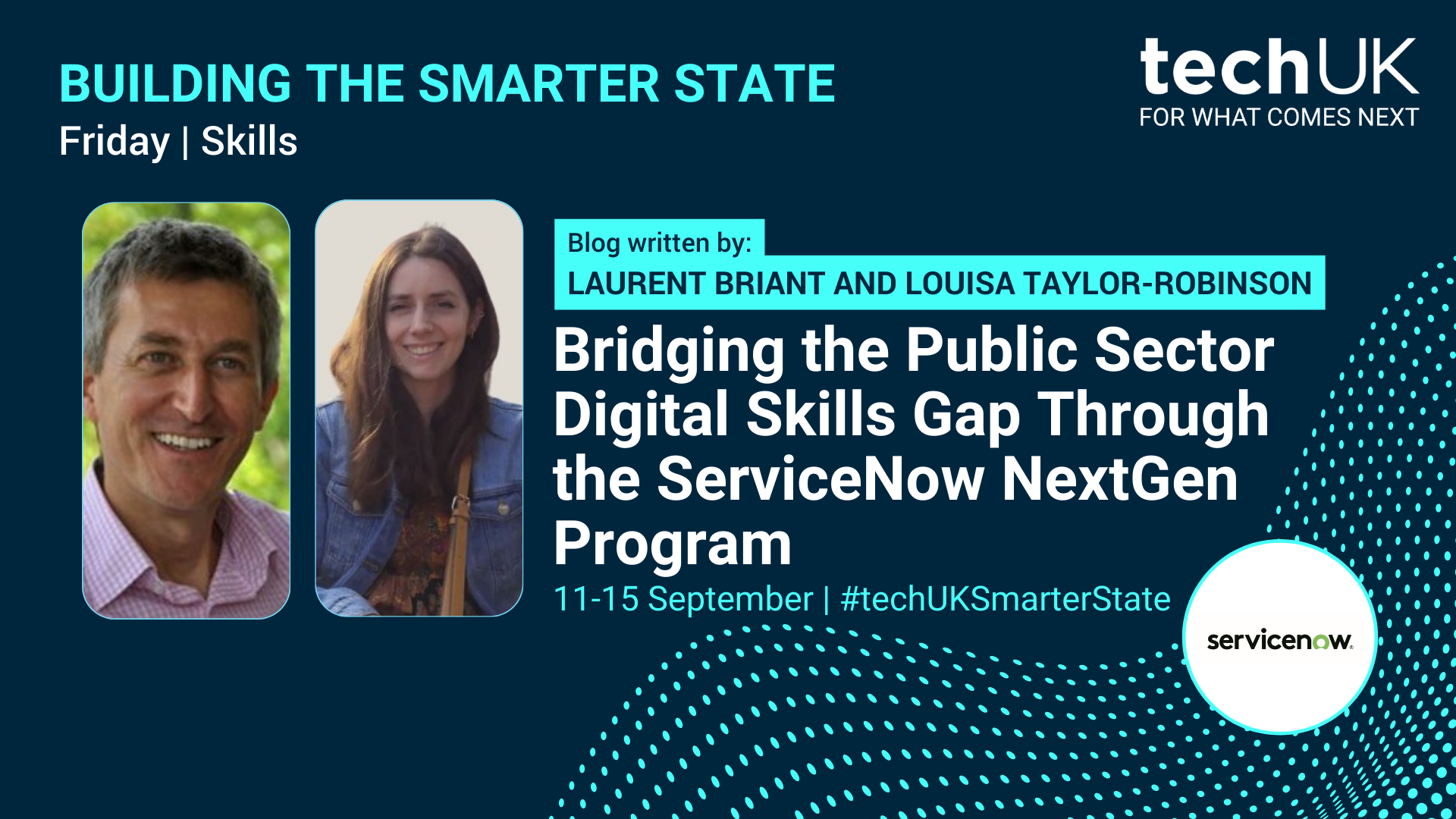ServiceNow: Bridging the Public Sector Digital Skills Gap Through the ServiceNow NextGen Program #techUKSmarterState
Four in five jobs advertised in the UK require digital skills, but the lack of available talent is holding back growth. Estimates suggest the digital skills gap costs the UK economy as much as £63 billion a year in potential GDP.
The problem is particularly pronounced in the public sector. Research and advisory firm IDC estimates that 90% of organisations will be affected by digital talent shortages, and the National Audit Office (NAO) reports that UK Government already has a specialist skills deficit. Only 4% of civil servants are digital professionals, compared with an industry average of between 8% & 12%. Furthermore, the NAO reported that government digital, data and technology vacancies rose by 7% from 3,900 in April 2022 to 4,100 in October 2022.
Bridging the digital skills gap is therefore crucial for the effective functioning of a Smarter State, where technology plays a pivotal role in delivering public services and driving efficiency.
In the UK, the government has embarked on its 2022-2025 digital and data strategy, Transforming for a Digital Future, which sets out an ambitious plan for a transformed, more efficient digital government that provides better outcomes for everyone.
While many facets of technology and improvements in digital service delivery have revolutionised the way that public services are delivered, the state still falls behind the private sector in their freedom to innovate and develop digital solutions.
Improvements in government digital functions benefit us all. Across the country, people make use of government services every day. Every time someone files a tax return, registers for a passport, or applies for a benefit, they use government infrastructure to do so – and increasingly, these interactions happen in the digital sphere. Sustaining a Smarter State means government services can run more effectively, reduce costs, and deliver savings for the taxpayer, while also improving the experiences of end users who rely on these services, often at times of greatest need and vulnerability.

NextGen at ServiceNow: The Power of Private-Public Partnerships
Fostering private-public partnerships is a crucial part of ensuring the state can innovate and is in everyone’s interests. By partnering with private sector organisations, technology companies, and start-ups, governments will be able to provide training, mentorship, and apprenticeship opportunities to their own staff, as well as under-skilled members of the wider population – which is essential to tackling the digital skills crisis across all sectors.
At ServiceNow, we work closely with the UK government, leveraging our industry expertise to design triaging training programs. Our funded NextGen programs ensure the workforce of today are being trained for the jobs of tomorrow. Participants in our Skills Bootcamp in Service Design and Management and Apprenticeship programs in Digital & Technology Solutions, and Data Science gain comprehensive ServiceNow and wider digital skills.
These programs offer robust training that is carefully designed to maximise participants’ value in the workplace, so they can apply their new skills immediately and continue to grow. Through regular networking sessions and speed-hiring days, employers across the country can employ motivated, skilled NextGen alumni – with no training or recruitment costs attached.
ServiceNow continue to support NextGen alumni beyond their training, while making it easier for employers to find the talent they need. We recently launched Talent Connect – a database of job-ready talent with the technical and soft skills needed to thrive in the digital economy. Every individual on the portal has received over 400 hours of ServiceNow training, interpersonal skill development, hands-on experience, and is eager to develop their digital career.
As NextGen programs are flexible and free to the participant, they open the doors for everyone. Many participants hail from underserved communities and marginalised populations, including refugees, women returning to the workforce, and veterans. This brings new perspectives into the digital workforce, which helps solve problems creatively and address the needs of service users that may otherwise be neglected.
Additionally, employers make use of NextGen programs to upskill or reskill their existing staff; while a significant number of participants are career changers who find new opportunities in tech.
NextGen in Action
Diana Tomova was interested in a career in IT but didn’t know how to break in when she came across the NextGen program. Run in partnership with the UK government, the 13-week Bootcamp she took part in was free, entirely online, and allowed her the flexibility to continue working full-time. She joined an established mentorship program, supported by experienced digital professionals. At the end of the Bootcamp, Diana took part in a speed hiring event organised by ServiceNow and landed an apprenticeship with her first-choice employer - the Department for Environment, Food and Rural Affairs (Defra).

In a blog for National Apprenticeships Week, Diana wrote: “I really enjoyed the experience of studying in the Bootcamp, while still being able to work. It was challenging, for sure, but it was the most rewarding and exciting challenge I could have wished for.
“It's crucial to mention that my lack of IT experience didn't stop Defra from recruiting me. That’s such an important point to take away from my story. After having settled into my role I have a much clearer understanding of the many opportunities a career in IT can open. I feel like there isn’t a role out of my reach.”
Diana is now part of a team which has seen call times for support staff halved through effective digital transformation and staff upskilling, which means more time is spent addressing customer issues and less in repetitive administrative tasks.
Defra has reported that this has supported the morale and mental health of its staff, and ensures issues are handled efficiently and proactively – for the benefit of their workforce, the digital capabilities of their department, and the needs of ordinary people who use Defra’s services every day.

Laurent Briant is Director of Global Government Programs at Service Now.
Louisa Taylor-Robinson is NextGen Project Coordinator at ServiceNow.
Learn more about ServiceNow’s NextGen and RiseUp initiatives.
To find ServiceNow-skilled and motivated talent directly, please use the Talent Connect portal.
From 11 – 15 September techUK is running our annual Building the Smarter State Week in the run-up to the ninth edition of our flagship public services conference, Building the Smarter State, on Wednesday 27 September. Book your tickets here.


